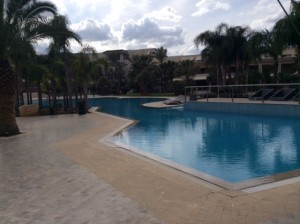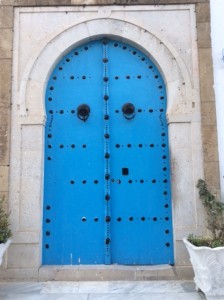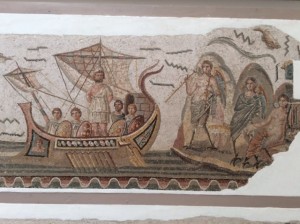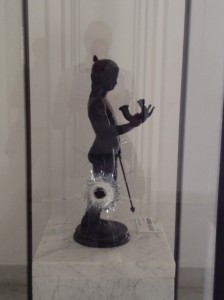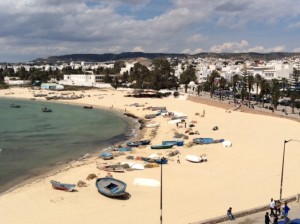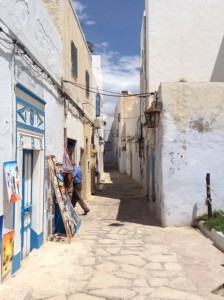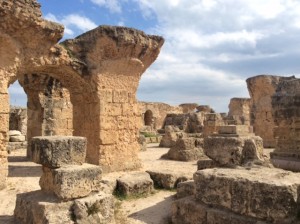Terrorism has become an unfortunate fact of life in our world. We are all affected in some way but the impact is not distributed equally and arguably not fairly. This post looks at the impact of two attacks in 2015 directed at tourists in Tunisia – the country where the Arab Spring started and is struggling to survive. If we want to make a personal statement against terrorism – sometimes the answer is as simple as showing up somewhere.
Three Men with Guns
Two attacks involving a total of three armed men effectively destroyed the most important part of the economy of an entire country. Tunisia developed a very successful tourist industry since its independence in 1956 based on location, sun, sand, historical and archeological heritage plus a friendly and accommodating people. In spite of the convulsions of the Arab Spring, Tunisia sustained a robust tourist industry with 6,000,000 visitors per year.
I visited Tunisia a few weeks ago. Virtually new tourist resorts stand empty like the Sphinx waiting for the nearby Sahara to encroach and leave its mysteries. Some hotels remain open like zombies, pretending to be open, staff dressed and ready, tables set, cushions by the pool but devoid of any other life.
We toured a fabulous 5-star resort with 300 rooms and suites, great location and outstanding design and facilities. We were told that the hotel was serving a total of 15 guests and many of these are Tunisians taking advantage of exceptional values. Drivers and guides suggested that an honest estimate of the tourist industry since the two terrorist attacks was a drop of 95%.
Two armed men entered the spectacular Bardo National Museum mid-morning of March 18, 2015. We were told the guards were on coffee break – what a price to pay for slack management of security! The Bardo is focused on the mosaics recovered from the extensive Roman ruins and the earlier Carthaginian challenger to Rome.
The Museum is housed in a former Ottoman palace and the complicated structure created opportunity for local guides to take advantage of their knowledge of the building. When they heard gunfire they guided their guests through hidden hallways to safety. Some tourists were less fortunate and were trapped in the former harem with no escape. 22 Tourists were taken hostage and killed but 400 others escaped in the confusion.
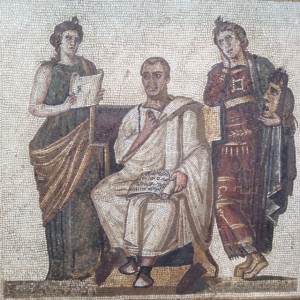
Mosaic of the poet Virgil flanked by the muses Poetry and Eloquence. This mosaic is considered the Mona Lisa of the mosaic world.
The museum has re-opened and there is a large plaque in the modern entry recording the names and nationalities of those who died. The glass cases and other exhibits damaged by the wild gunfire have been controversially left displaying their wounds together with their history. Our guide estimated daily visitors at 20.
The sun and sand tourism is concentrated on the long Mediterranean coast south of Tunis and on the island of Djerba. On June 20, 2015 a lone gunman walked onto the beach while tourists were taking the sun and enjoying the water. He shot every person in sight and followed the panicked sun-seekers into the hotel. He was finally killed by a guard. 38 tourists died in this senseless attack.
Tunisia depends on mass tourism driven by charters, groups and good value. When such an attack occurs embassies issue warnings which impact this kind of tourism. Warnings by Government can have the secondary effect of preventing access to insurance coverage for tour operators – and they switch destinations.
The net effect is catastrophe for a country like Tunisia where 400,000 of its citizens were employed directly or indirectly in the tourism industry. Tunisia has no oil so tourism matters!
The events we refer to as the Arab Spring started in Tunisia when a frustrated street vendor Mohammed Bouazizi burned himself to death in the middle of the market. The totally unexpected result was a popular response that forced the increasingly unpopular and corrupt dictator Zine El Abidine Ben Ali from office and the country in 28 days.
This single spark lit the fire that is consuming much of the Middle East. Alone among the nations of the region, Tunisia is sustaining a fragile democracy. The loss of its most important industry will not be helpful.
In 2002 we visited the island of Bali several weeks after the terrorist event in Kuta that killed 202 mostly young tourists. Our visit was in part a deliberate statement of support for a community that was not responsible for the attack and was itself a victim. We wandered around the very popular artist town of Ubud and I counted at best two dozen people I would judge not to be local. Ubud would typically be crowded with thousands.
A local shopkeeper commented that when the 9-11 attacks occurred in New York there was a popular outcry – “Visit New York to show the terrorists that they will not win – but when Bali suffers a single attack – and the perpetrators are already in jail – the same people warn tourists to avoid Bali – why the difference?”
It will be interesting to observe the response of tourists and Governments to recent attacks in Brussels, Paris and Istanbul. I would not be surprised if Governments are under pressure to protect the reputations and tourism in these politically prominent cities. But who ever said the world was a fair place!
Last night we wandered through the delightful bohemian part of Rome known as Trastavere. The narrow streets were filled with the young (and a few our age) celebrating life and friendship. We noted soldiers in military gear and carrying visible guns stationed at every little piazza. There was no known immediate threat but the statement was clear. Rome and other cities that survive because of global visitors cannot afford the risk of becoming another Paris.
One street vendor can start a revolution and three misguided young men can destroy the economic foundation of a country.
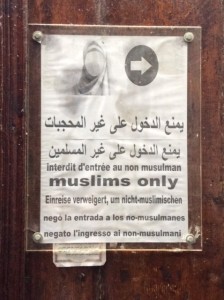
Entry restricted to Muslims at the oldest mosque in North Africa. Unusual since visitors allowed in most mosques around the world.
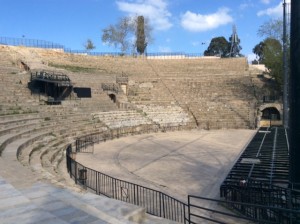
Greek Theatre in Tunis that survived the Roman centuries and the Arab and Ottoman empires. Now hosts global musical acts.

